Introduction, Features, Specifications
INTRODUCTION
A few months ago I reviewed the Synology DS415+, a four-disk NAS unit that I found to be a great device, with plenty of grunt thanks to its quad core Intel Atom processor. Now Synology have sent me another NAS, the DS715. This also features a quad-core CPU, but apart from that it is quite different to the previous unit.
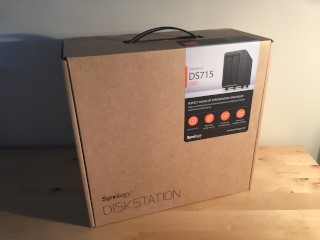 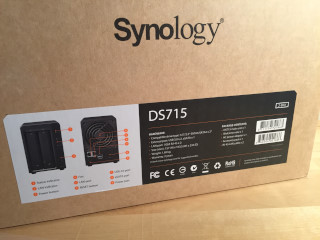
The DS715 is aimed at small/medium businesses - situations like an office with 10-15 staff. The new NAS's quad-core CPU is an Annapurna Labs Alpine AL-314, an ARM Cortex-A15-based processor, running at a modest 1.4ghz. Compared to the 2.4ghz Intel C2538 in the DS415+, the AL-314 CPU isnít that grunty, but being a quad core means it can handle a reasonable number of simultaneous tasks. This is exactly what you want for an SMB NAS - something that can handle file shares, serve a few websites/web tools, maybe a couple of printer queues, run backups, but nothing requiring great amounts of brute force like transcoding video.
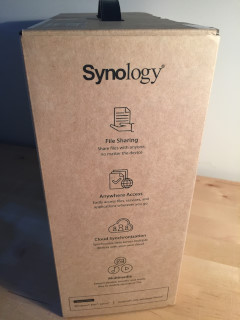 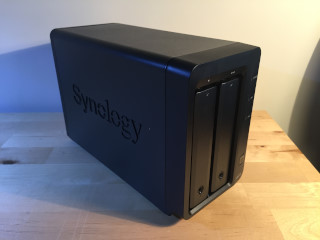
This NAS also only takes two drives but itís expandable with the optional DX513 five-drive expansion unit. Thereís also a larger expansion unit, the DX1215 but this is incompatible with the DS715 due to the DX unit using the Infiniband communications standard for its management, but the DS715 only supports eSATA, so youíre stuck with the DX513 and its five extra drives when itís time to grow. Still, 7 drives total gives you a lot of storage with modern drive sizes.
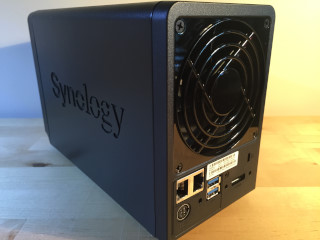 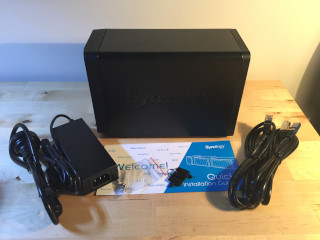
Interestingly, when the DX513 is added to the DS715, all seven drives can be used to create a single continuous disk group, but the DS415+ I reviewed previously is only capable of treating it like an external eSATA drive. This makes the previous unit miss out on quite a bit of management functionality, such as not being able to create one single volume from all nine of its disks. You would have to create a second disk group of only the drives in the external DX513. If you do require a continuous volume with more than four drives in the base NAS unit, Synology sell the DS1515+ which is a DS415+ but with an extra drive bay, more memory, more USB ports plus it supports two expansion units rather than one, giving you 15 drives in total. However, it does cost ~$300 more.
Expansion units aside, another difference in the newer DS715 is the drive bay access doors which swing up in a rather fancy fashion and are much nicer than the front panel of the DS415+. However there's no USB socket on the front panel this time, only two USB3 slots on the back of the unit. There are two gigabit Ethernet ports which support link aggregation and failover modes, which is a standard feature of most Synology NAS units.
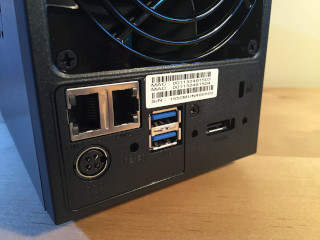 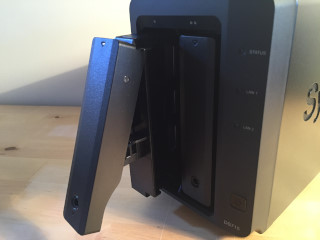
SPECIFICATIONS
CPU Annapurna Labs Alpine AL-314 Quad Core running @ 1.4 GHz including floating Point, Hardware Encryption Engine
System Memory 2 GB DDR3
Storage Drive Bay(s) - 2
Maximum Drive Bays with Expansion Unit - 7
Compatible Drive Type 2.5" SATA II/III HDD/SSD, 3.5 SATA III/SATA II HDD.
Maximum Internal Raw Capacity- 16 TB (8 TB HDD X 2) (Capacity may vary by RAID types)
Maximum Raw Capacity with Expansion Units - 56 TB (8 TB HDD X 7) (Capacity may vary by RAID types)
Maximum Single Volume Size 108 TB
For more specs, go to Synology's DS715 page.
|


